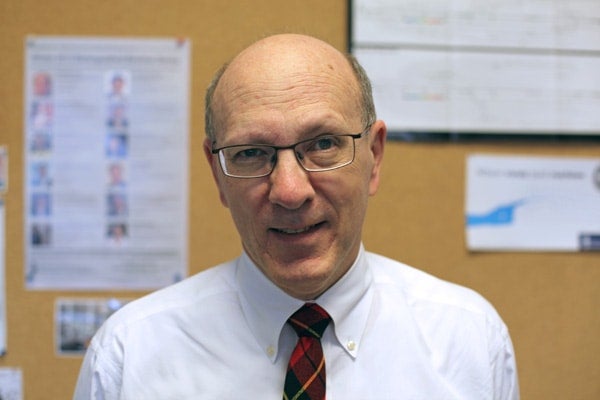
Great teaching at U of T: tips from an expert
Published: April 27, 2012
What fuels great teaching?
Having taught for more than 30 years at U of T, Professor Jim Wallace has seen dramatic changes in the content of the courses and the skills of the students he teaches. But one thing hasn’t changed.
“The students have to know you care,” says Wallace.
A professor in the Department of Mechanical and Industrial Engineering, Faculty of Applied Science and Engineering, Wallace had no teacher training when he arrived on campus in 1978. So he modelled his approach on an instructor from his PhD program.
“He cared – and one of the biggest factors in successful teaching is that the students understand and perceive that you care,” Wallace said. “I can still picture him with his eyes full of fire in front of the classroom. He just clearly wanted you to understand what he was so excited about.”
Wallace is one of three winners of U of T’s 2011-2012 President’s Teaching Awards. He is joined by Professor Ivan Silver, Department of Psychiatry, Faculty of Medicine and Karen Reid, a senior lecturer with the department of Computer Science.
The awards recognize sustained excellence in teaching, research on teaching, and the integration of teaching and research.
“Jim has decades of experience conducting research on the topics of internal combustion engines, combustion, and fuels,” said Cheryl Misak, vice-president and provost. “His research projects have been a great source of examples that he incorporates into the courses he teaches.”
The Director of the Engine Research and Development Laboratory at the University of Toronto, Wallace’s internal combustion engine research specializes in the combustion of alternative fuels, including biogas, methanol, natural gas, propane and hydrogen in spark ignition engines and biodiesel in diesel engines. His work focuses on reducing engine exhaust emissions. In 2001 he was made a Fellow of the Society of Automotive Engineers (SAE) for his contributions in the area of alternative fuels.
“Students need some motivation for learning and that comes from seeing where things are useful,” Wallace said. “For engineering students they want to know: what can I do with this? Because the applications are changing so fast it’s important to take examples from current research or current technology so that they can make an immediate connection.”
A course he teaches on fundamentals provides a perfect example.
“Some of the fundamentals can be dreary and to tackle the mathematics involved or the theory behind something you have to see what you’re going to be able to do with it,” Wallace said. “The same fundamentals that were used to design steam engines are also used to design aircraft engines - you have to keep showing them what they’re going to do with this stuff to get them inspired.”
Decades ago, Wallace found his field attracted students experienced in fixing farm machinery or cars. But students now hail mostly from urban backgrounds and often have little hands-on experience with machines.
“We don’t have car tinkerers anymore. I’m an engine expert but even I can’t work on my own car today – I don’t have $100,000 worth of special tools. But these students think nothing of opening up their computer and changing half a dozen things, which I find mystifying.
“Today’s students are just as smart as they ever were but their skill sets are wildly different. We have to take that into account in our curriculum and it’s a never-ending challenge.”
Over the years Wallace has experimented with new teaching techniques and formats, from an all-power-point approach to an online course. Such innovations don’t always succeed, but “you can’t let that stop you from trying,” he said.
The only thing that doesn’t change is the importance of caring.
“I teach a course on alternative energy, and when you talk about wind turbines you talk about the direction the wind is coming from, in terms of the points of the compass,” Wallace said. “One day, I had a student ask me what a compass was.”
“We tend to assume a certain background - but nobody’s a boy scout or a girl guide anymore and they may have no concept of things we may take for granted. At least the student asked. And that goes back to the point that they have to know that you care. Part of caring is how you respond to questions.
“It is essential: you can’t have them worry about asking a question.”
This article is the second in the Great Teaching series on the winners of the 2011-2012 President's Teaching Awards. Read the first instalment, a profile of Senior Lecturer Karen Reid, here.



